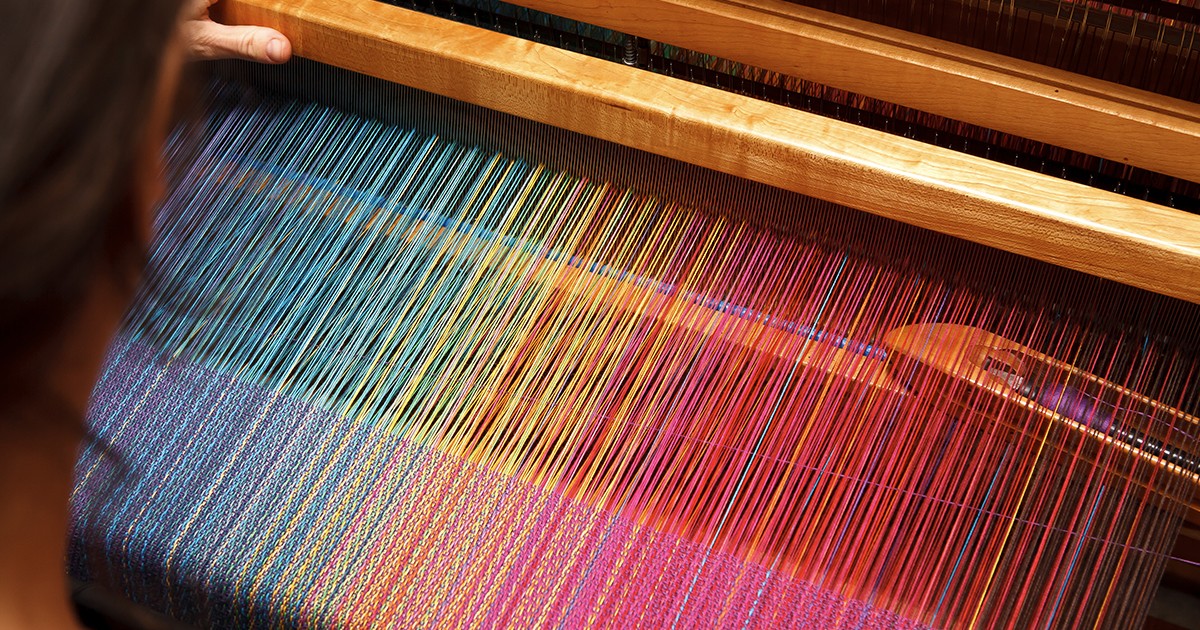
By Mary Ann Larkin
Germinating made me a poet. My mother died just months after I had married. My body could neither absorb the horror of her death nor admit to myself that she would no longer be my lodestone. Something in me forbade such suffering. I didn’t choose to stifle my grief. Rather, it simply did not surface. My new life went on, oblivious of my unexpressed sorrow.
But after 11 years, after marriage and motherhood, I separated from my husband, moving with my children to Cleveland. During my married years, I had begun weaving, in love with the gorgeous yarns I transformed into beautiful fabrics. I hoped to continue this work, but, unbeknownst to me, my body had made its own plans. In some mysterious way, the grief from my failed marriage caused my sorrow over losing my mother to at last break free. Inertia first signaled the coming eruption. Each morning, I tried to force myself into the weaving studio I loved, but lethargy overwhelmed me. Only later did I understand that denying the sadness that had lain dormant for those 11 years finally had used up my energy. One fall day, in disgust at what I thought of as my laziness, I sat outside my studio and sternly told myself: Don’t move until there’s something you want to do.
After a time of sitting, vainly hoping to recover my vanished energy, uncontrollable weeping–a mudslide of weeping– began to rage through me. Tectonic plates, deep in my body, scraped and groaned as grief pushed against them. Sorrow for my mother, which only deepened as fall turned into winter and winter into spring, convulsed me. As I wept, sleep began its work, pulling my body down into a deep unknowing. Something stronger than my once forceful will had overtaken me. In my exhaustion, a part of me welcomed any transforming power, even one changing me into a weepy rag doll. But while I collapsed into the deliciousness of abandoned effort, I also huddled, mystified to the point of fear.
As fall inched into winter, my old life wavered like a mirage. Only my children kept part of me in the world. Each morning, after taking them to school, I came home, took the phone off the hook, and slept until they returned in the afternoon, when we resumed our lives together. At night, I went to bed when they did, getting up with them in the morning. My loom waited for me, my luscious yarns no longer woven into new forms. Friends wondered at my absence. But I had forgone volition and effort. I wept and slept, not caring if I ever stopped.
As the year turned, it brought another upheaval. I began to write poems. Though reading and writing had been my passion since childhood, I had seldom written poetry. Now poems began to push to the surface, hesitant but sure as winter crocuses. Weaving, where I had first found a creative home, was being transmuted into poetry. As I wrote, my muscles relaxed. My mind abandoned its lockstep habit of moving from one activity to another. As though for the first time, I watched clouds darken and snows come. I wrote a love poem to myself:
and crocuses, lovely words
nothing bought or sold:
A shell, a stone, a piece of bark,
poppies stuffed with golden pollen.
I want to live with you
in a house of vines
and gnarled branches,
sip blackberry juice
out of acorn cups,
drop cherries in your mouth
and sleep on beds
of peacock feathers.
In the mornings
we’ll pot geraniums
and brew our tea.
I’ll make love to you and you’ll make love to me.
“Why, you’re germinating,” my poet friend Barbara Angell told me. I loved that image of blind, unknown forces marshalling in a darkness. I thought of seeds: of their unstoppable impulse to reach the light, of the light bending to pull their shoots from earth, of the earth parting in welcome. I saw myself as just such a patch of earth, waiting, dumb and uncertain, but acted on by an inexorable process I had given myself up to. I loved the mystery of it. I loved being part of the mystery. I loved not understanding the mystery. Through that dark Cleveland winter, I wept and slept and wrote, wrapped in unknowing, with no more anticipation of an end point than a seed has.
Months later, in April, when all things become new, poems had taken the place of tears and sleep. I felt alive, lighter, exhilarated yet peaceful, and proud, as though I had come back from some underworld I wasn’t sure I would have the strength to leave. The air brimmed with possibilities. At the same time, I felt exhausted, but in a victorious way, as after a birth, or a battle, where I had found the courage to surrender to my sorrow and to the poems that kept germinating in a joyous jumble.